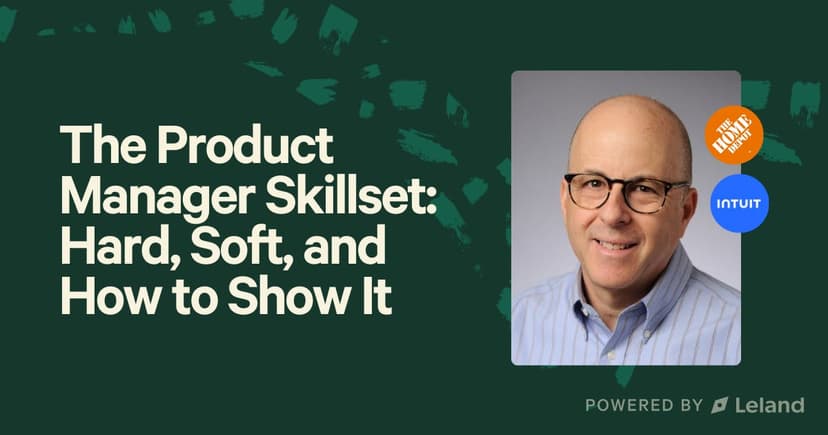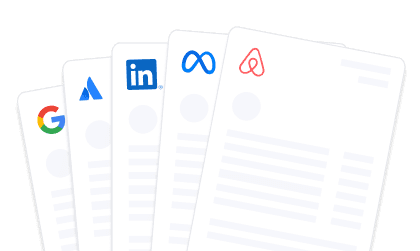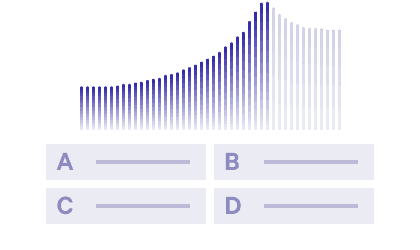Microsoft Product Manager: Interview Process, Salary, & Responsibilities
If you’re looking to land a product management role at Microsoft, you’ll need to ace the behavioral interview.
Posted July 24, 2025

Join a free event
Learn from top coaches and industry experts in live, interactive sessions you can join for free.
Table of Contents
Microsoft Product Manager roles are among the most sought-after positions in the tech industry. As a Product Manager (PM) at Microsoft, you’ll develop innovative products, collaborate with cross-functional teams, and solve complex challenges to meet customer needs. To secure such a role, candidates must excel in a rigorous interview process that evaluates technical, strategic, and behavioral skills. The Microsoft PM interview process typically spans four to eight weeks and includes stages such as the initial recruiter screening, which emphasizes cultural fit and knowledge of Microsoft's product ecosystem.
This comprehensive guide will help you prepare for Microsoft Product Manager interviews. We’ll explore the role, its responsibilities, the interview process, and actionable strategies to succeed. Whether you’re an experienced PM or new to product management, this resource is your blueprint for success.
What Does a Microsoft Product Manager Do?
As a Microsoft Product Manager, you are at the forefront of driving the company’s innovative products. Your role involves overseeing, developing, and managing Microsoft’s product lifecycle from concept to completion. Acting as the voice of the customer, you ensure every decision aligns with user needs and expectations.
Key Responsibilities
A significant part of a Product Manager’s role is understanding the customer deeply. This involves:
- Conducting user interviews, surveys, and focus groups to gather insights on customer needs.
- Performing comprehensive market research to maintain a competitive edge.
- Defining and executing product strategies to meet business and user goals.
- Developing and managing detailed product roadmaps.
- Creating workflows and processes to optimize team efficiency.
- Collaborating with engineering, design, and sales teams to ensure seamless execution.
- Preparing for product launches, including testing and developing marketing strategies.
- Gathering and analyzing user feedback to refine and enhance products.
- Ensuring alignment with Microsoft’s broader business goals and vision.
Differences from Other PM Roles
At Microsoft, the Product Manager role has unique attributes. While many companies use the term “Product Manager,” Microsoft often refers to these professionals as “Program Managers.” Despite the title variation, the responsibilities align closely with product management roles at other tech companies. Additionally, a degree in business administration is valued for Microsoft PM roles.
Key distinctions include:
- Broader scope – Microsoft PMs tackle a wider range of responsibilities, including internal process optimization, cross-team alignment, and partner communications.
- Technical involvement – Microsoft PMs are expected to possess a strong understanding of the technical aspects of their products. This technical expertise enables them to make informed decisions and collaborate effectively with engineering teams.
- Strategic influence – Beyond product development, PMs contribute to shaping Microsoft’s overarching strategies and ensuring cohesive execution across diverse teams.
The Microsoft Product Manager Interview Process
The Microsoft Product Manager (PM) interview process is a multi-step approach designed to evaluate candidates on their technical expertise, problem-solving skills, leadership abilities, and alignment with Microsoft’s values and culture. Each stage requires preparation and a clear understanding of the expectations.
Microsoft interviews are conducted virtually, primarily via Microsoft Teams, and include a structured on-site interview process with various types of questions—behavioral and technical. Typical participants in these interviews include PM peers, a senior PM, and a senior executive. Here’s an overview with practical advice for each step:
1. Initial Application and Resume Review
Your resume serves as the foundation for securing an interview. To stand out:
- Tailor your resume to emphasize product management experience, technical skills, and measurable achievements.
- Highlight key competencies such as data analytics, product design, and working with engineering teams.
- Focus on roles where you demonstrated leadership, collaboration, and successful project management outcomes.
- Mention familiarity with tools and technologies relevant to Microsoft, like Microsoft Teams or data-driven decision-making.
2. Phone Screen
- Prepare to discuss your background, including specific product manager and project management experiences, as the hiring manager will be assessing your fit during the phone screen stage.
- Be ready to answer behavioral questions about teamwork and communication, such as how you’ve collaborated with other team members or handled uncertain situations.
- Expect product questions like analyzing your favorite product or suggesting improvements for a Microsoft product.
- Demonstrate knowledge of Microsoft’s tools and an understanding of the role of PMs at Microsoft.
3. Behavioral Interviews
- Use the STAR method (Situation, Task, Action, Result) to structure your answers.
- Be ready to discuss examples of managing projects, resolving conflicts with team members, and leading in situations with many candidates involved.
- Focus on topics like leadership, cross-functional collaboration, and adapting to uncertain situations.
- Show how your experiences align with Microsoft’s culture and values, particularly their emphasis on inclusivity and success in product development.
4. Product Design and Strategy Interviews
- Practice data-driven decision-making scenarios, such as improving a Microsoft product based on customer feedback or business goals.
- Be prepared to design features for a product, focusing on alignment with user needs, business objectives, and technology feasibility.
- Familiarize yourself with product strategy, product design, and examples of successful projects you’ve managed or contributed to.
5. Technical Interviews
While technical depth isn’t the primary focus, you’ll need to demonstrate sufficient knowledge to work closely with developers and engineering teams:
- Review fundamental computer science concepts, including product architecture and data analytics.
- Show that you understand how to enable collaboration between product managers, individual contributors, and team members.
- Mention relevant experience with tools and technologies that help in developing and scaling products.
6. Final Round: "As-Appropriate" Interview
- Share your understanding of Microsoft’s product management philosophy and your alignment with their goals.
- Highlight your ability to deliver impactful results while aligning with the company’s core values, such as inclusivity, collaboration, and customer obsession.
- Be prepared to discuss compensation details, including base salary, additional pay, and growth opportunities.
Key Skills Microsoft Looks for in a Product Manager
Microsoft seeks candidates with a blend of technical expertise, strategic thinking, and leadership capabilities. Here are the core skills you’ll need to demonstrate:
1. Product Vision and Strategy
- Microsoft expects PMs to create and execute a clear product vision that aligns with business objectives.
- Show your ability to analyze market trends, understand customer needs, and develop strategic product roadmaps.
- Provide examples of how you’ve prioritized features or initiatives to deliver results that align with business goals.
2. Technical Proficiency
- While you don’t need to be a developer, understanding computer science fundamentals and the ability to collaborate with technical teams is critical.
- Highlight your experience working with developers or engineering teams to build and ship products.
- Mention tools, systems, or specific technologies you’ve used to enable product success, especially those relevant to Microsoft platforms or data analytics.
3. User-Centric Focus
- Microsoft places a strong emphasis on creating exceptional user experiences.
- Demonstrate how you’ve conducted user research, gathered customer feedback, and translated insights into actionable product features.
- Share examples of working closely with customers to address their needs and improve satisfaction.
4. Leadership and Collaboration
- As a PM at Microsoft, you’ll be expected to lead cross-functional teams and manage multiple stakeholders.
- Highlight your ability to align team members, drive projects forward, and foster collaboration across teams with diverse skill sets.
- Provide examples of managing projects involving other team members, overcoming challenges, or resolving conflicts in uncertain situations.
5. Data-Driven Decision-Making
- Microsoft values a data-driven approach to product management.
- Familiarity with tools like SQL, Excel, or Tableau will distinguish you from other candidates.
- Provide specific examples where you’ve used data analytics to inform decisions, measure success, or optimize products.
- Discuss your ability to leverage metrics to set priorities and achieve measurable results.
Common Microsoft Product Manager Interview Questions
When preparing for a product manager interview, it's crucial to be ready to answer a few questions that are commonly asked. These questions often cover both behavioral and product design-related topics, requiring candidates to think creatively and provide unique insights in their responses.
Here are some common interview questions you might encounter:
- Can you describe a time when you had to manage a challenging project?
- How do you prioritize features for a new product?
- What is your approach to user research and gathering customer feedback?
- How would you improve our current product?
- Can you give an example of a successful product launch you managed?
By preparing for these questions, you can demonstrate your ability to handle the diverse challenges of a product management role.
Behavioral Questions
- Tell me about a time you faced conflict within a team and how you resolved it.
- Describe a product you led from idea to launch.
- How do you get people to agree with your point of view?
- Share an example of managing a project under uncertain conditions.
Product Design Questions
- What’s your favorite Microsoft product, and how would you improve it?
- Design an alarm clock for visually impaired users.
- How would you enable collaboration for remote teams using Microsoft Teams?
Technical Questions
- How would you explain cloud computing to someone who isn’t technical?
- Design a method to remove every other node from a linked list.
How to Prepare for the Microsoft PM Interview
1. Research Microsoft’s Products and Culture
- Familiarize yourself with Microsoft’s mission, values, and product portfolio. Understand their focus on empowering diverse users and businesses globally.
- Study life at Microsoft Redmond, and tailor your answers to reflect the company’s emphasis on innovation, collaboration, and inclusivity.
- Be prepared to discuss Microsoft products like Microsoft Teams and how they align with the company’s vision.
2. Use the STAR Method for Behavioral Questions
- Situation: Set the context by describing the challenge or scenario.
- Task: Explain your role and the specific responsibilities you took on.
- Action: Detail the steps you took to address the challenge, emphasizing collaboration, leadership, or data-driven decision-making.
- Result: Share measurable outcomes, such as impact on customers, team members, or product success.
3. Practice Product Design and Case Questions
- Prepare for product design and strategy questions by working through scenarios that test your ability to solve problems, address customer needs, and make strategic decisions.
- Use structured frameworks like MECE (Mutually Exclusive, Collectively Exhaustive) to break down problems logically and present clear, actionable solutions.
- Focus on data-driven approaches when proposing product improvements or business strategies.
4. Highlight Collaboration and Leadership
- Share examples where you successfully led teams or worked cross-functionally with other team members, engineers, or business stakeholders.
- Demonstrate your ability to align diverse groups, including many candidates and contributors, toward a common goal.
- Discuss situations where you’ve resolved conflicts or managed uncertain situations to achieve results.
5. Demonstrate Technical Knowledge
- While deep technical expertise isn’t required, show your ability to work closely with developers and engineering teams.
- Highlight tools, platforms, or technologies you’ve used in past projects, such as those involving data analytics, development, or enabling collaboration.
- Be ready to discuss how you applied technical knowledge to solve problems or contribute to product success.
Access Top Coaching Resources
Get access to 150+ video guides, example resumes, exercises, templates, and technical skill-building tools created by top coaches. Start for free today!
Post-Interview Follow-Up: Thank-You Notes and Next Steps
1. Send a Timely Thank-You Note
- Aim to send your thank-you note within 24-48 hours of the interview. This ensures your message is received while your interview is still fresh in the interviewer’s mind.
- Use email as the preferred medium unless the interviewer explicitly indicates another format.
2. Personalize Your Thank-You Note
- Address the interviewer(s) by name and reference specific points discussed during the interview. For example:
- Mention a product or strategy they shared that you found exciting or insightful.
- Highlight a specific question or discussion that challenged and engaged you, showing your enthusiasm for the role.
Example: "I particularly enjoyed our discussion about integrating user feedback into Microsoft Teams’ development cycle. It aligns closely with my experience in designing features that improve customer satisfaction."
3. Reaffirm Your Interest in the Role
- Express your enthusiasm for the position and your alignment with Microsoft’s mission and values. Be specific about why the role excites you and how your skills can contribute to the team’s goals.
Example: "I’m deeply inspired by Microsoft’s commitment to empowering every person and organization. The opportunity to drive data-driven product decisions as a Product Manager would be a thrilling next step in my career."
4. Politely Inquire About Next Steps
- Close your thank-you note by asking about the next steps in the process. Phrase your inquiry professionally and courteously.
Example: "Could you kindly share any insights on the next steps in the process? I’m also happy to provide any additional information or references as needed."
Final Thoughts
Preparing for a Microsoft Product Manager interview requires a combination of technical knowledge, strategic thinking, and effective communication. By understanding the role, researching the company, and practicing common scenarios, you’ll position yourself as a standout candidate. Remember to stay confident, use real-life examples, and demonstrate your passion for driving innovation.
Work with Product Management Coaches
Work with a Product Management Coach to improve your skills, prepare for interviews, and plan your next career step. Whether you’re starting or aiming higher, coaching can help you succeed.
Read next:
- What is Product Management?
- What Is a Product Lead and Why Is It So Important?
- The Product Execution Interview: Ultimate Guide (With Common Questions)
- How to Ace Your Microsoft Product Manager Interview
- How to Get Into Product Management (An Expert's Perspective)
- The 50 Most Common Product Manager Interview Questions (With Sample Answers)
- An Overview of the Different Roles in Product Management
- The Best Newsletters & Podcasts for Product Management
FAQs
What is the salary level of a product manager at Microsoft?
- Microsoft Product Managers typically earn a total compensation package ranging from $120,000 to $200,000+ annually, including base salary, bonuses, and stock options, depending on experience, role level, and location.
What does a PM do in Microsoft?
- Microsoft Product Managers define product strategy, collaborate with cross-functional teams, ensure user-focused design, and manage the product lifecycle from planning to post-launch improvements.
What is the role of a product manager?
- A Product Manager analyzes market needs, creates strategic roadmaps, leads teams, and ensures successful product delivery by balancing user needs, technical feasibility, and business objectives.
What is the acceptance rate for Microsoft PM?
- The acceptance rate for Microsoft PM roles is highly competitive, with only a small percentage of candidates securing the job. This is due to the rigorous Microsoft interview process, which evaluates both technical and leadership abilities. Knowing why Microsoft and how your experience aligns with their vision can improve your chances of success.
Browse hundreds of expert coaches
Leland coaches have helped thousands of people achieve their goals. A dedicated mentor can make all the difference.


























